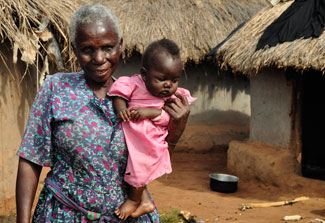H3Africa spurs range of genomic research, training
November / December 2015 | Volume 14, Issue 6
By Cathy Kristiansen
African scientists have begun to study genomic influences on disease across their continent, from differences in the progression of HIV in children, to sleeping sickness susceptibility, to treatment response in sickle cell disease. They recently described their research and training programs, supported by the Human Heredity and Health in Africa (H3Africa) initiative, at a meeting on the NIH campus. NIH and the Wellcome Trust launched H3Africa five years ago to foster genomic and epidemiological research in African scientific institutions.

© 2009 Jessica Alderman, courtesy of Photoshare
An older woman holds an infant in a rural village near
Gulu, Uganda.
The achievements to date of this $74-million multiyear program, managed in partnership with the African Society of Human Genetics, have been "remarkable," according to NIH Director Dr. Francis S. Collins. For instance, H3Africa has enrolled 20,000 participants in research and is currently training 250 Africans in genomics-related topics. The H3ABioNet has established 37 bioinformatics training locations in 17 countries; and Uganda, Nigeria and South Africa have developed biorepositories. Collins said, "I do believe H3Africa is creating a critical mass of research capability in the institutions that are involved."
Also underscoring H3Africa's progress was Wellcome Trust board's deputy chair, Dr. Kay Davies. "The genomics revolution in Africa is well under way," she said. "Networks are going particularly well in bioinformatics. Transformation is what we are producing."
Several H3Africa-funded researchers at the meeting described their ongoing projects. Newborns with HIV usually fall ill within three years, but some children contain the virus for up to a decade. Dr. Gabriel Anabwani, of the Botswana-Baylor Children's Clinical Center of Excellence, and his team have flagged for further study more than a dozen genes that might play a role.
Human African trypanosomiasis, or sleeping sickness, is hard to treat by the time it is typically diagnosed. Some people suffer disability or death, but others can eliminate the culprit parasites from their body. Dr. Enock Matovu and colleagues at Uganda's Makerere University are comparing genes in susceptible and resistant people, hoping to spur new diagnoses and treatments. They have sequenced the genomes of 180 people so far and additionally contributed to Uganda's biobank.
Concentrations of nose and throat microorganisms may play a role in pneumonia - a leading killer of young children - and asthma. Scientists at the University of Cape Town collected more than 35,000 nasal swabs from children to show how different strains of Staphylococcus aureus ebb and flow, depending on the child's age. "We have been able to set up a fantastic [research] backbone using our H3Africa funding and collecting novel data," said team leader Dr. Mark Nicol. The group will continue its analysis of colonization patterns and health risks. Other H3Africa research at the university is deepening understanding of sickle cell disease - long known to be a genetic condition but with variable symptoms difficult to predict - to identify the most appropriate public health interventions. Dr. Ambroise Wonkam and his colleagues have recruited 350 participants, held focus groups, conducted in-depth interviews and applied for several grants to conduct additional research.
Both genetic and environmental factors influence stroke, which is a major health burden in Nigeria. To identify stroke risk factors, Dr. Mayowa Owolabi and his team at the University of Ibadan first developed software to standardize data on the stroke type, installed solar panels for consistent power supply, produced a documentary to boost recruitment and devised a plan to use mobile phone reminders to retain study participants.
A multicountry study led by Dr. Christian Happi, of Redeemer's University in Nigeria, aims to improve clinical diagnostics of fever-producing illnesses, which are key causes of death and disability in rural Africa. However, the project was sidetracked by the outbreak of the Ebola epidemic and the team instead worked around the clock to help confirm cases in the region, developing new sequencing methods for the Ebola virus and clarifying humans as the main vector.
An announcement of funding opportunities for the next phase of H3Africa grants is expected in 2016.
More Information
To view Adobe PDF files,
download current, free accessible plug-ins from Adobe's website.